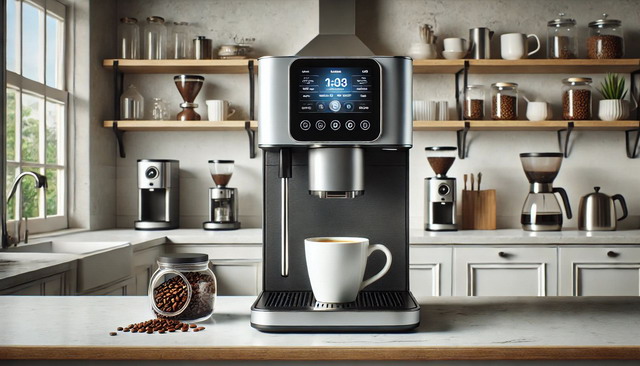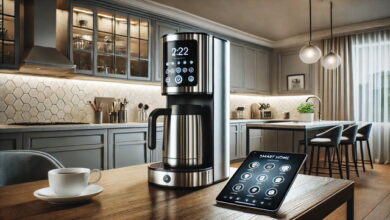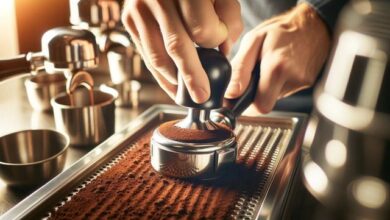Coffee Maker Technology Advancements in 2025: A New Era of Brewing Innovation
Coffee Maker Technology Advancements in 2025
As we enter 2025, the world of coffee brewing is undergoing a transformative shift, driven by advancements in technology that aim to satisfy the ever-evolving demands of coffee enthusiasts. No longer are coffee makers mere kitchen appliances; they’ve become sophisticated devices designed to brew the perfect cup with precision, convenience, and sustainability in mind. From smart connectivity to eco-friendly features, coffee makers in 2025 represent a blend of innovation and craftsmanship that caters to the modern consumer.
In this blog post, we’ll explore how coffee maker technology has evolved, particularly focusing on the integration of smart technology and sustainability. These trends not only reflect changes in the way we brew coffee but also mirror larger shifts in consumer values—toward convenience, personalization, and environmental responsibility. Let’s dive into the fascinating developments that are reshaping the coffee industry.
1. Smart Coffee Machines with WiFi Connectivity
In the fast-paced world of 2025, convenience is king, and nothing says convenience quite like a coffee maker that can be controlled remotely via your smartphone. Smart coffee machines equipped with WiFi connectivity are rapidly becoming a staple in modern kitchens, offering users the ability to brew their favorite cup of coffee without even being in the same room.
How WiFi-Enabled Coffee Makers Enhance Convenience
Imagine waking up to the smell of freshly brewed coffee, without lifting a finger. WiFi-enabled coffee makers allow users to program their machines through mobile apps, setting specific brew times, selecting coffee strength, and even choosing the type of brew, all from the convenience of their phone. For busy professionals, this means they can start their morning cup while getting ready for the day, ensuring that their coffee is ready the moment they walk into the kitchen.
These smart machines also enable users to monitor the status of their coffee, receive notifications when their brew is ready, and even track maintenance needs like cleaning and descaling. With the integration of WiFi, coffee makers have transcended their traditional role, becoming part of the smart home ecosystem where every appliance works in harmony to simplify daily tasks.
Integration of Mobile Apps to Control Coffee Brewing Remotely
The key to the success of these WiFi-enabled coffee makers lies in the seamless integration of mobile apps. Leading brands in 2025, like Keurig and Nespresso, have developed intuitive apps that allow users to control every aspect of their coffee-making process from anywhere. These apps offer a variety of features, from scheduling and adjusting brew settings to discovering new coffee recipes and blends tailored to user preferences.
The rise of these apps is a testament to the growing importance of customization in the coffee-drinking experience. No longer do users have to settle for a one-size-fits-all brew. Instead, they can tailor every detail to their liking, ensuring that each cup meets their exact specifications.
For those who live in households with multiple coffee drinkers, the ability to create multiple user profiles within the app adds another layer of convenience. Each person can save their preferred settings, meaning the coffee maker can seamlessly switch between brewing an espresso for one person and a cappuccino for another, without manual intervention.
Key Brands Offering WiFi-Enabled Coffee Machines in 2025
As of 2025, several major brands have embraced smart technology, offering a wide range of WiFi-enabled coffee machines. Keurig’s K-Supreme Plus Smart is a standout example, with its innovative BrewID™ technology, which recognizes the type of coffee pod inserted and adjusts the brewing process accordingly. The Nespresso Expert is another leading model, offering precision temperature control and customizable brew sizes via its companion app.
Other brands, such as Breville and De’Longhi, have followed suit, incorporating WiFi capabilities into their espresso machines, allowing coffee aficionados to experiment with brewing techniques and adjust settings to achieve barista-level quality from the comfort of their home. As competition increases, we can expect even more innovation in this space, with machines offering greater integration with other smart home devices and voice assistants like Alexa and Google Assistant.
2. Sustainable Coffee Makers with Eco-friendly Features
In addition to convenience, 2025 is seeing a significant rise in consumer awareness around environmental issues, and the coffee industry is no exception. As a result, sustainable coffee makers are gaining popularity, with brands introducing eco-friendly features designed to minimize waste, reduce energy consumption, and promote the use of sustainable materials. This trend is not just a response to consumer demand but a reflection of broader global efforts to combat climate change and reduce the environmental impact of everyday products.
Rise of Eco-conscious Consumers and Demand for Sustainable Products
The modern coffee drinker is more environmentally conscious than ever before. With increasing awareness of the negative impact that single-use plastics, excessive water usage, and non-biodegradable waste have on the planet, consumers are seeking out products that align with their eco-friendly values. In response, coffee maker manufacturers are incorporating sustainable materials, such as recycled plastics and biodegradable components, into their designs.
Additionally, many consumers are moving away from single-use coffee pods, which have long been criticized for contributing to landfill waste. Instead, they are opting for machines that offer reusable filters or use sustainable pod alternatives, such as compostable or recyclable options. This shift has prompted manufacturers to innovate, finding ways to make eco-friendly brewing not only possible but convenient and affordable.
Coffee Makers with Biodegradable Materials and Energy-saving Modes
One of the most significant advancements in coffee maker technology in 2025 is the use of biodegradable materials. Brands like Philips and Technivorm have started to offer coffee machines built from eco-friendly materials, such as bioplastics made from renewable resources. These machines not only reduce the reliance on petroleum-based plastics but also ensure that once the coffee maker reaches the end of its life cycle, it can be responsibly disposed of without harming the environment.
Energy efficiency is another key focus for sustainable coffee makers. Many machines now come with energy-saving modes that reduce power consumption when the machine is idle or automatically power down after a period of inactivity. This not only lowers electricity bills but also reduces the overall carbon footprint of the device.
Brands Focusing on Green Technology and Sustainability in Coffee Brewing
Several brands have positioned themselves at the forefront of the sustainability movement in coffee brewing. Jura, a Swiss company known for its high-end coffee machines, has introduced a range of energy-efficient models that use up to 40% less power than their predecessors. Similarly, Miele offers coffee makers with eco-mode settings and a commitment to using sustainably sourced materials.
On the pod-based front, companies like Nespresso have made significant strides in sustainability, with their aluminum pods now being fully recyclable. Nespresso has also expanded its recycling program, making it easier for consumers to return used pods for proper recycling.
3. Coffee Makers with Advanced Brewing Algorithms
In 2025, the introduction of advanced brewing algorithms is revolutionizing how coffee is made. Gone are the days when coffee was brewed using a one-size-fits-all approach. Instead, intelligent brewing systems now use machine learning and artificial intelligence to tailor the brewing process to individual preferences, ensuring that each cup of coffee is as personalized as possible. These advancements allow coffee makers to adapt to a variety of brewing methods and extract the best flavors from different types of coffee beans.
Introduction to AI and Machine Learning in Coffee Makers
AI and machine learning are no longer confined to industries like healthcare or finance—they’ve found their way into the world of coffee brewing. Coffee makers in 2025 are equipped with sensors that gather data on variables like water temperature, brewing time, and coffee grind size. These machines use this data to fine-tune the brewing process, ensuring that every cup of coffee is brewed to perfection.
AI-powered coffee machines learn from user preferences and make adjustments to the brewing process based on historical data. For example, if a user prefers a stronger brew in the morning but a lighter one in the afternoon, the coffee maker can automatically adjust the water-to-coffee ratio and brewing time accordingly. This level of customization takes the guesswork out of brewing and ensures that users get the perfect cup every time.
How Brewing Algorithms Personalize the Coffee-Making Experience
Brewing algorithms analyze a wide range of factors to optimize the brewing process. These include the type of coffee bean, grind size, water quality, brewing temperature, and extraction time. By adjusting these variables in real-time, the coffee maker can enhance flavor extraction and deliver a cup that suits the user’s specific taste profile.
Some advanced coffee makers even allow users to input their preferred flavor notes, such as fruity, nutty, or chocolatey, and the machine will adjust its settings to bring out those flavors in the brew. This personalized experience appeals to coffee aficionados who want to enjoy a café-quality cup at home without the complexity of manual brewing techniques.
Examples of Advanced Coffee Makers with Customizable Brewing Profiles
Several high-end coffee machines in 2025 are leading the charge when it comes to advanced brewing algorithms. Machines like the Breville Oracle Touch and the De’Longhi PrimaDonna Elite offer users the ability to create and save customized brewing profiles, which can be accessed through touchscreen interfaces or mobile apps. These profiles allow users to set specific brewing parameters, such as water temperature, brew strength, and extraction time, giving them full control over the brewing process.
Additionally, brands like Jura have introduced AI-powered espresso machines that automatically adjust brewing settings based on the user’s coffee preferences and consumption patterns. The Jura machines also come with integrated cleaning and maintenance schedules, ensuring that the machine remains in optimal condition without requiring much user intervention.
4. Voice-controlled Coffee Makers with AI Assistants
As smart homes become more prevalent, coffee makers are now joining the ranks of devices that can be controlled using voice commands. In 2025, coffee makers with integrated AI assistants like Amazon Alexa, Google Assistant, and Apple’s Siri are becoming increasingly popular, allowing users to brew coffee with simple voice commands. These machines combine the convenience of hands-free operation with advanced brewing technology, making the morning coffee routine smoother than ever before.
Growth of Smart Home Technology Integrating Coffee Makers
Smart home technology is designed to streamline everyday tasks, and coffee makers are a natural addition to this ecosystem. Voice-controlled coffee makers can be integrated into existing smart home setups, allowing users to control them alongside other devices like lights, thermostats, and security systems. This integration means that users can set up routines where their coffee starts brewing automatically when their morning alarm goes off, or when the kitchen lights are turned on.
In addition to brewing coffee, these machines can also provide real-time updates on the brewing process. For example, users can ask their AI assistant how much time is left before the coffee is ready or request that the machine switches off after brewing is complete. The ability to control coffee makers through voice commands adds a level of convenience that aligns with the increasingly busy lifestyles of modern consumers.
The Role of AI Assistants in Controlling Coffee Makers
AI assistants like Alexa and Google Assistant are playing an increasingly important role in making coffee brewing more intuitive and user-friendly. With a simple voice command, users can start or stop brewing, adjust brewing settings, and receive notifications when their coffee is ready. Some machines also allow users to set up voice-activated routines, making it possible to have coffee brewed automatically at the same time every day without manual intervention.
For instance, a user can say, “Alexa, brew me a cup of espresso,” and the coffee maker will initiate the brewing process using pre-programmed settings. If the user wants a stronger cup or a different brew style, they can issue additional commands to adjust the coffee strength or brewing method on the fly. This integration not only enhances convenience but also makes coffee makers more accessible to individuals with disabilities or limited mobility, who may find traditional interfaces more challenging to use.
Pros and Cons of Voice-activated Coffee Makers
Pros:
- Hands-free operation: Users can brew coffee without having to physically interact with the machine, making it ideal for multitasking or busy mornings.
- Customizable voice commands: AI assistants allow users to set specific brewing preferences and access features like scheduling, status updates, and maintenance reminders.
- Integration with smart home systems: Voice-activated coffee makers can be incorporated into broader smart home routines, offering seamless automation and control.
Cons:
- Limited control for intricate settings: While voice commands are convenient, they may not offer the same level of precision as manual controls for users who prefer detailed customization.
- Dependence on internet connectivity: Voice-controlled coffee makers rely on internet access to communicate with AI assistants, so users may face disruptions if their connection is weak or unstable.
- Higher price point: As with many smart home devices, voice-activated coffee makers tend to be more expensive than traditional models due to their advanced features and AI integration.
5. High-tech Espresso Machines for Coffee Enthusiasts
For coffee enthusiasts, espresso is more than just a drink—it’s an art form. In 2025, high-tech espresso machines are offering unprecedented levels of control and precision, allowing users to experiment with various brewing techniques and achieve café-quality espresso at home. These machines are equipped with advanced features like pressure profiling, temperature control, and dual boilers, all of which contribute to the perfect espresso shot.
Advanced Features of Espresso Machines in 2025
One of the standout features of high-tech espresso machines in 2025 is pressure profiling, which allows users to control the pressure throughout the brewing process. Pressure profiling can have a significant impact on the flavor and texture of espresso, enabling users to adjust the flow rate and extraction pressure to bring out specific flavor notes in the coffee. This feature is particularly appealing to seasoned coffee enthusiasts who want to fine-tune their espresso shots to achieve the perfect balance of sweetness, acidity, and bitterness.
Another key feature is temperature control. Espresso machines in 2025 are equipped with advanced temperature regulation systems that maintain consistent water temperatures throughout the brewing process. This is crucial for ensuring that the coffee grounds are evenly extracted, which directly affects the flavor and crema of the espresso.
Many high-end espresso machines also come with dual boilers, allowing users to brew espresso and steam milk simultaneously. This feature is particularly valuable for those who enjoy making milk-based drinks like cappuccinos and lattes, as it speeds up the preparation process and ensures that both the espresso and steamed milk are at their optimal temperatures.
How Precision Technology Improves Espresso Brewing
Precision is the hallmark of a great espresso, and the latest espresso machines are designed to give users complete control over every aspect of the brewing process. Features like adjustable grind size, precise water measurement, and variable pressure extraction allow users to experiment with different brewing parameters and create espresso that matches their personal preferences.
For example, some machines allow users to program specific pre-infusion times, which is the period during which water is allowed to saturate the coffee grounds before full pressure is applied. This step can be crucial for enhancing the flavor of the espresso, particularly with lighter roasts. With these advanced controls, users can recreate the experience of a professional barista in their own kitchen.
Brands Pushing the Boundaries of Espresso Machine Technology
Several brands are leading the way in developing high-tech espresso machines that cater to coffee aficionados. La Marzocco is known for its commercial-grade machines that have been adapted for home use, offering advanced features like pressure profiling and PID temperature control. Similarly, Rocket Espresso produces high-end machines that combine traditional Italian craftsmanship with modern technology, providing users with the precision and performance needed to make café-quality espresso at home.
For those looking for an all-in-one solution, brands like Breville and De’Longhi offer espresso machines with integrated grinders, ensuring that users can grind fresh coffee beans to the perfect consistency just before brewing. These machines also come with pre-programmed espresso settings, making it easier for beginners to achieve great results without having to master the intricacies of espresso brewing.
6. Coffee Makers with Built-in Grinders and Single-serve Options
One of the most exciting advancements in coffee makers in 2025 is the integration of built-in grinders and single-serve options. These all-in-one machines offer the ultimate convenience for coffee lovers who want the freshest brew possible without the hassle of using separate devices. Whether you’re brewing a single cup or multiple servings, these machines cater to both needs while ensuring the quality of each cup remains consistent.
Rise of All-in-One Coffee Makers with Grinders for Fresh Brewing
The idea of an all-in-one coffee maker with a built-in grinder has gained immense popularity, especially among coffee enthusiasts who value freshness. Grinding coffee beans just before brewing ensures maximum flavor extraction, as pre-ground coffee tends to lose its aroma and taste over time. Coffee makers with integrated grinders eliminate the need for a separate grinder, making the brewing process quicker and more streamlined.
These machines often come with adjustable grind settings, allowing users to choose the coarseness of the grind depending on their brewing method—whether it’s espresso, drip coffee, or French press. The convenience of having both grinding and brewing functions in one device is a major selling point, especially for those with limited counter space who still want a high-quality coffee experience.
Comparison of Single-serve Coffee Makers with Built-in Grinders
Single-serve coffee makers with built-in grinders are a game-changer for people who want to enjoy a freshly brewed cup without making a full pot. In 2025, these machines have become more advanced, offering users the ability to grind just the right amount of beans for one cup, ensuring minimal waste and maximum freshness.
Unlike traditional single-serve machines that use pods, built-in grinder models allow users to brew coffee using freshly ground beans. This not only enhances the flavor but also addresses environmental concerns by reducing the waste generated by single-use pods. Brands like Cuisinart and Breville are leading the charge with machines that offer both single-serve and full-pot brewing options, making them versatile enough to meet a variety of needs.
These machines also feature programmable settings, so users can customize the grind size, brew strength, and cup size to suit their preferences. This flexibility makes them ideal for households where people have different tastes in coffee, as each person can easily brew their preferred cup without affecting the next brew.
Best Coffee Makers Combining Fresh Grinding and Single-serve Features
Several coffee makers in 2025 are combining the best of both worlds: freshly ground coffee and single-serve convenience. The Breville Barista Express remains a top choice for coffee lovers, offering a built-in conical burr grinder with precise grind size adjustments, allowing users to grind beans directly into the portafilter for espresso or into a cup for single-serve brewing.
Another excellent option is the Cuisinart DGB-2, which combines a grinder, single-serve function, and reusable filter basket. This model is perfect for eco-conscious users who want to avoid disposable pods while still enjoying the convenience of single-serve brewing. With multiple grind and strength settings, it offers a personalized experience that suits a variety of tastes.
7. Cold Brew Coffee Makers with Speed and Precision
Cold brew coffee has been a favorite for many, especially during the warmer months, but traditionally, the brewing process could take anywhere from 12 to 24 hours. In 2025, however, new advancements in cold brew coffee makers are cutting down this lengthy wait time without sacrificing the smooth, rich flavor that cold brew fans love. These machines are designed to brew cold coffee with unprecedented speed and precision, making it easier for users to enjoy their favorite cold beverages whenever they want.
Technological Innovations in Cold Brew Coffee Makers
The cold brew process typically involves steeping coarse coffee grounds in cold water over an extended period, which results in a smooth, less acidic coffee. While the long brewing time has been part of the cold brew’s charm, advancements in technology are now making it possible to speed up the process significantly without compromising the quality of the final product.
New cold brew coffee makers use vacuum technology, pressurized systems, and even ultrasonic waves to extract flavor quickly. These machines can brew a full batch of cold brew coffee in as little as 10 to 45 minutes. For consumers who love the taste of cold brew but don’t have the patience for traditional methods, this is a game-changer.
For instance, the Dash Rapid Cold Brew Coffee Maker uses vacuum extraction technology to brew cold coffee in under 15 minutes, while maintaining the rich, smooth flavor that cold brew enthusiasts appreciate. This model also allows users to adjust the strength of their brew, offering a personalized experience that suits different preferences.
How New Advancements Shorten the Time to Brew Cold Coffee
The key to faster cold brew lies in innovative brewing techniques. Vacuum technology, which creates a low-pressure environment during brewing, accelerates the extraction of coffee flavors from the grounds, significantly reducing the brew time. Similarly, ultrasonic agitation is another method that speeds up the brewing process by using sound waves to agitate the coffee grounds, helping to extract flavors more quickly.
Cold brew coffee makers in 2025 also offer improved precision when it comes to controlling brew strength and flavor. Many machines come with programmable settings that allow users to adjust the brew time and coffee-to-water ratio, resulting in a more consistent and customizable cold brew experience.
Top Cold Brew Coffee Makers with Enhanced Precision in 2025
Several top-of-the-line cold brew coffee makers have emerged in 2025, each offering unique features that appeal to different kinds of coffee drinkers. The OXO Cold Brew Coffee Maker continues to be a favorite, thanks to its rainmaker design that evenly distributes water over the coffee grounds, ensuring uniform extraction for a smooth, balanced brew.
For those looking for speed without compromising taste, the Gourmia Automatic Cold Brew Coffee Maker is a standout option. Using rapid circulation technology, this machine can brew cold coffee in as little as 10 minutes. It also features multiple strength settings, so users can choose between a light, medium, or strong cold brew.
8. Coffee Maker Water Filtration Systems
The quality of water plays a crucial role in the overall taste of coffee, yet it is often overlooked by many home brewers. In 2025, coffee makers with built-in water filtration systems are making it easier for consumers to brew better-tasting coffee by ensuring that only the purest water is used in the brewing process. These machines filter out impurities such as chlorine, minerals, and other contaminants that can affect the taste and quality of the coffee.
Importance of Water Quality in Coffee Brewing
Water makes up over 98% of a cup of coffee, so its quality has a significant impact on the final flavor. Hard water, which contains high levels of minerals like calcium and magnesium, can lead to poor extraction and dull the taste of coffee. Similarly, chemicals like chlorine, which are often found in tap water, can impart unpleasant flavors to the brew.
Coffee makers with built-in filtration systems address these issues by removing impurities and ensuring that the water used for brewing is as clean and pure as possible. This not only enhances the flavor of the coffee but also extends the lifespan of the machine by preventing mineral buildup that can cause scaling and damage over time.
Coffee Makers Equipped with Advanced Water Filtration Systems
Several coffee makers in 2025 come with advanced water filtration systems designed to purify water and improve coffee quality. The Braun MultiServe Coffee Maker, for example, includes a charcoal water filter that removes chlorine and other contaminants from tap water, ensuring that only clean, fresh water is used for brewing. This not only enhances the taste of the coffee but also helps to preserve the machine’s longevity by reducing the risk of mineral buildup.
Another standout is the Cuisinart Perfectemp Coffee Maker, which comes with a gold-tone filter and an integrated water filtration system. This combination ensures that both the coffee grounds and water are filtered for the best possible flavor. Additionally, it features a self-cleaning function that helps to maintain the cleanliness of the water reservoir over time.
How Filtration Systems Enhance the Taste and Quality of Coffee
Filtration systems work by removing unwanted chemicals and minerals from water, leading to better extraction of the coffee flavors during the brewing process. When water is free of impurities, it allows the coffee’s natural flavors and aromas to shine through, resulting in a cup of coffee that tastes cleaner, brighter, and more balanced. Moreover, using filtered water helps prevent the formation of scale inside the coffee maker, which can clog components and alter the brewing process.
By using a coffee maker with a high-quality water filtration system, users can ensure that every cup is brewed with optimal water quality, leading to a noticeable improvement in the overall coffee-drinking experience.
9. Coffee Makers with Touchscreen Interfaces and Custom Settings
As technology continues to revolutionize coffee makers in 2025, touchscreen interfaces and customizable settings have become a standard feature in many high-end machines. These advanced interfaces offer a sleek, user-friendly experience, allowing coffee drinkers to take full control of their brewing process with just a few taps. Whether it’s adjusting brewing time, temperature, or strength, touchscreen coffee makers provide a level of precision and personalization that was once only available in professional cafés.
The Evolution of Touchscreen Technology in Coffee Makers
Touchscreen technology has made significant advancements in the coffee maker industry over the last few years. In 2025, many machines are equipped with vibrant, intuitive screens that replace traditional buttons and dials, offering a modern aesthetic and enhanced functionality. This shift allows users to interact with their machines in a more streamlined way, making it easier to navigate through various settings and programs.
Coffee makers like the Breville Barista Touch or Jura E8 feature large, color touchscreens that guide users step-by-step through the brewing process. These machines come preloaded with a variety of drink options—such as espresso, cappuccino, latte, and more—allowing users to select their desired drink with a single touch. Additionally, the screens provide real-time updates on the brewing process, making it easier for users to monitor their coffee as it’s being prepared.
Customizable Settings for Different Brewing Methods and Coffee Strengths
One of the most appealing aspects of touchscreen coffee makers is the ability to fully customize brewing settings. Whether users prefer a bold, strong espresso or a light, delicate pour-over, touchscreen coffee makers allow them to adjust the grind size, water temperature, brew time, and coffee strength to suit their exact preferences. Many machines even allow users to save these settings as personalized profiles, so they can easily recreate their favorite cup with consistency every time.
For instance, the De’Longhi PrimaDonna Soul allows users to customize everything from coffee volume to milk froth density, making it easy to brew everything from a rich espresso to a frothy cappuccino. Once the preferred settings are saved, users can select their customized brew with just one tap, making it convenient for households with multiple coffee drinkers who each have their unique preferences.
Leading Brands Offering Touchscreen-controlled Coffee Machines
Several leading coffee maker brands have embraced touchscreen technology, offering a range of machines that cater to both casual drinkers and serious coffee aficionados. Jura, known for its high-end, automatic coffee machines, features touchscreen interfaces across many of its models, providing users with advanced control over their brewing experience. The Jura Z10, for example, offers a dual-speed touchscreen that allows users to control the extraction process with precision, resulting in a perfectly balanced cup of coffee every time.
Other brands like Breville and Miele have also integrated touchscreens into their latest models. These machines come with pre-programmed recipes for various coffee drinks, allowing users to experiment with different brewing techniques while maintaining full control over customization options like temperature, grind size, and extraction time.
10. Portable and Compact Coffee Makers for Travel and Small Spaces
As the demand for convenience continues to rise, coffee makers in 2025 are becoming increasingly portable and compact, catering to the needs of travelers, office workers, and those living in small spaces. Whether it’s brewing a fresh cup in a hotel room or on a camping trip, portable coffee makers have made it easier than ever for coffee lovers to enjoy their favorite brew wherever they go. These compact machines also offer a space-saving solution for those with limited kitchen space, without compromising on quality or performance.
Rise of Portable and Space-saving Coffee Makers in 2025
Portable and compact coffee makers have seen a surge in popularity, thanks to their lightweight design and ease of use. These machines are typically smaller than standard coffee makers and are designed to be highly portable, making them ideal for travel, outdoor adventures, or small living spaces like apartments or dorm rooms. Despite their size, many of these machines are capable of brewing high-quality coffee, rivaling that of larger, more expensive models.
In 2025, brands like AeroPress and Wacaco have continued to lead the portable coffee maker market. The AeroPress Go, for example, is a compact version of the popular AeroPress, offering the same versatile brewing options—espresso, Americano, cold brew—in a smaller, more travel-friendly package. Similarly, the Wacaco Nanopresso allows users to brew espresso on the go, thanks to its hand-powered, piston-driven design, making it a favorite among campers and hikers.
Features and Benefits of Travel-friendly Coffee Machines
Portable coffee makers are designed with ease of use and convenience in mind. Many models are hand-powered or battery-operated, eliminating the need for electricity, which makes them perfect for outdoor use. Additionally, these machines often come with built-in grinders or reusable filters, ensuring that users can brew fresh coffee without relying on pre-ground coffee or single-use pods.
Some portable coffee makers, like the Stanley Classic Travel Press, combine a French press with an insulated travel mug, allowing users to brew and drink from the same device. This all-in-one design is perfect for busy mornings or travel, as it minimizes the number of accessories needed for brewing. Moreover, many portable machines are easy to clean and maintain, making them a hassle-free option for on-the-go coffee lovers.
Best Compact Coffee Makers for Small Kitchens and Outdoor Adventures
When it comes to compact coffee makers, the Nespresso Essenza Mini stands out as a top choice for those with limited kitchen space. Despite its small size, the Essenza Mini delivers the same high-quality espresso as larger Nespresso machines, making it ideal for small apartments or offices. For those who prefer manual brewing methods, the Hario V60 or Kalita Wave provide excellent pour-over coffee without taking up much counter space.
For travelers and outdoor enthusiasts, the Handpresso Pump is a portable espresso maker that requires no electricity or batteries, making it a perfect companion for camping trips or long hikes. Similarly, the Cafflano Klassic is an all-in-one portable coffee maker that combines a grinder, kettle, dripper, and cup into a single device, making it one of the most versatile and convenient travel coffee makers on the market.
11. Future Trends in Coffee Maker Technology
As we look ahead, it’s clear that the coffee maker industry will continue to evolve, with new technologies emerging to make brewing coffee at home even more accessible, efficient, and personalized. The future of coffee makers will likely be shaped by advances in AI, automation, and sustainable design, offering coffee drinkers more control and choice than ever before.
Predictions for the Next Wave of Coffee Maker Innovations
Looking to the future, coffee makers are expected to become even more intelligent, with AI and machine learning playing a larger role in the brewing process. These machines will be able to learn from user behavior, making automatic adjustments to brewing parameters based on individual preferences and consumption patterns. We can also expect to see more integration with smart home systems, allowing users to control their coffee machines through voice commands or automated routines.
Another exciting trend is the potential for robotic coffee makers, which could automate every step of the coffee-making process, from grinding and brewing to milk frothing and cleaning. These machines would eliminate the need for human intervention, delivering a perfectly brewed cup of coffee at the touch of a button.
How AI, Automation, and Sustainability Will Shape Future Coffee Makers
Sustainability will remain a major focus for the coffee maker industry, with future machines likely incorporating even more eco-friendly features, such as energy-efficient brewing systems, recyclable components, and biodegradable materials. The trend toward zero-waste coffee makers—machines that generate no plastic waste or single-use materials—will likely continue to grow as consumers demand more environmentally responsible products.
Automation will also be a key factor in the evolution of coffee makers. Future machines may come equipped with automatic bean-to-cup systems, which handle every aspect of the brewing process, including grinding, brewing, milk frothing, and self-cleaning. These machines could even be programmed to brew coffee based on a user’s daily routine, delivering a freshly brewed cup at the exact time it’s needed.
What Consumers Can Expect from Coffee Makers in the Coming Years
In the years ahead, consumers can expect coffee makers to become smarter, faster, and more sustainable. The continued integration of AI and smart home technology will make brewing coffee more convenient than ever, allowing users to fully automate their coffee routines. At the same time, the focus on sustainability will push manufacturers to create machines that minimize waste and reduce their environmental footprint.
Additionally, future coffee makers will likely offer even more customization options, allowing users to personalize their coffee down to the smallest detail. From precision temperature control to tailored brewing profiles, the coffee makers of tomorrow will provide a level of control and flexibility that was once unimaginable.
12. Conclusion: The Future of Coffee Brewing in 2025
The advancements in coffee maker technology we’ve seen in 2025 mark the beginning of a new era for coffee lovers. Coffee makers are no longer just tools for brewing; they’ve become sophisticated, smart devices that cater to our individual preferences, lifestyles, and values. From AI-powered machines that learn and adapt to our brewing habits to compact, portable coffee makers that make great coffee on the go, technology is reshaping how we interact with and enjoy our favorite beverage.
Recap of the Most Important Technological Advancements in 2025
In this journey through coffee maker technology, we’ve explored a wide range of innovations that have made their mark in 2025:
- Smart Coffee Machines with WiFi Connectivity: These devices allow users to control their brewing process from anywhere via mobile apps, providing convenience and customization in every cup.
- Sustainable Coffee Makers: With eco-friendly designs and energy-saving features, these machines cater to the growing demand for environmentally responsible products, reducing waste and conserving energy.
- AI-driven Coffee Makers: Advanced brewing algorithms and machine learning have enabled coffee makers to personalize each brew, ensuring that every cup meets the user’s unique taste preferences.
- Voice-controlled Coffee Makers: Integrating AI assistants like Alexa and Google Assistant, these machines add a hands-free convenience, allowing users to brew coffee with simple voice commands.
- Cold Brew Innovations: Cold brew coffee makers have made significant strides in 2025, using vacuum and ultrasonic technology to drastically cut down brewing times while maintaining quality.
- Water Filtration Systems: Coffee makers now come equipped with advanced filtration systems, ensuring that every cup is brewed with pure, filtered water for enhanced flavor and quality.
- Touchscreen Interfaces: Modern coffee makers feature user-friendly touchscreen controls that allow for greater customization, making it easy for users to adjust brewing settings for their ideal cup.
- Portable and Compact Coffee Makers: Catering to those with busy lifestyles or small spaces, these travel-friendly machines ensure that great coffee is accessible wherever you are.
How These Innovations Will Impact Coffee Lovers and the Industry
For coffee lovers, these advancements translate into a more personalized, convenient, and enjoyable coffee experience. Whether you’re a casual drinker looking for a quick morning cup or a dedicated enthusiast who wants to experiment with brewing techniques, the new technology available in 2025 offers a solution for every need.
On a larger scale, these innovations are transforming the coffee industry. As consumers continue to demand convenience, sustainability, and high-quality coffee at home, manufacturers are pushing the boundaries of what coffee makers can do. This is driving competition among brands to offer more advanced features, smarter machines, and eco-friendly designs, ultimately benefiting coffee drinkers with a wider array of options.
Final Thoughts on the Evolution of Coffee Maker Technology
The coffee makers of 2025 reflect the growing intersection of technology and daily life. As coffee machines become smarter and more connected, they’re empowering users to take control of their brewing process in ways that were unimaginable just a few years ago. At the same time, the focus on sustainability shows that the industry is committed to addressing environmental concerns, offering solutions that are as eco-friendly as they are efficient.
Looking ahead, it’s clear that the coffee maker industry will continue to innovate, driven by advancements in AI, automation, and green technology. We can expect coffee makers to become even more intuitive, energy-efficient, and customizable, shaping the future of coffee brewing for years to come.
Whether you’re brewing a simple cup of drip coffee or experimenting with advanced espresso techniques, the coffee makers of 2025 are designed to make every cup a rewarding experience, tailored to your tastes and lifestyle. It’s an exciting time for coffee lovers, and the future of coffee brewing has never looked brighter.








